Chapter 9: This Hurts Me More than it Hurts You
How Christian Parenting became Synonymous with Corporal Punishment
STRONGWILLED is a reader-supported publication. Thank you to everyone who has supported this publication and enabled it to exist. If you appreciate our work, please consider subscribing, sharing, or financially supporting this survivor-centric project.
In the last chapter, we traced how religions authoritarian parenting was rooted in the positive eugenics movement. Today, we discuss a primary authoritarian tool in creating submissive children: corporal punishment, and dig into how spanking became a spiritual ritual.
Content Warnings: corporal punishment, religious abuse of children. Please take care of yourself as you read about this issue.
Chapter 9: This Hurts Me More Than it Hurts You
“How do you think Jesus feels about what you did?” my dad asked me.
I (Krispin) was sitting in my parents’ dimly lit room, waiting for a spanking, probably eight or nine years old at the time. It was a Saturday afternoon, and a friend from church was over for a playdate with my brother and me. My dad had brought the vacuum out of the closet, and leaving the room he told us to not touch it, and that he’d be back soon. I usually was an obedient kid, a teacher’s-pet type, but at the goading of my friend, I ended up picking up the vacuum and dancing around the room like it was a guitar, and I was a rockstar. My dad returned, and a frustrated look immediately came over his face. “I specifically told you not to touch it. You disobeyed me.” He told me to go to his room, and now here I was, being asked how Jesus felt about my disobedience.
I remember the feeling of the mattress, curving under the weight of the two of us sitting side-by-side on its edge. To this day, I could only tell you what half of my parents’ room looked like, because the curtains were always closed, lit only by a bedside lamp that would illuminate parts of the bed, dimly catching the edge of the dresser, upon which a wooden paddle lived. It was a paddle that my dad created himself, specially crafted early in my childhood. “We won’t have to use it much, but it’s important,” he told me the weekend he’d gone to the lumber yard to get the wood, returning to the garage to use his power tools to carefully cut and sand it.
What did I think Jesus felt about what I’d done? Some part of my brain knew that I was supposed to say that Jesus was sad or disappointed, but I was flooded with anxiety, because now the paddle was no longer on the dresser. It was sitting on the bed next to my dad. I eked out the words, “He’s sad,” not sure if we’d have to talk more before being spanked, or if we’d get it over with quickly. At the doctor’s office, when I knew a shot was coming, they always tried to get it over with quick. I felt the same anticipatory dread, but my dad didn’t seem to have the same concerned hurry that the nurses showed. I also wondered if my friend would be able to hear the spanking from the other room, and how I could pretend I hadn’t been crying when I went back to play with him.
In a slow, calm voice my dad said, “You know this hurts me more than it hurts you.” He didn’t actually even say the word “spank,” using his few words to focus on how difficult this was for him, not on what was actually happening to me. I fawned an acknowledgement that I knew it was harder for him than it was for me, a necessary protocol before I crawled over to lay my stomach on his knees so he could spank me. I felt a sense of numbness spread throughout my body, as it tensed, bracing for pain.
Then the hit came, a swift sting. It was like I could feel his muscles moving through the paddle, sensing his subtle deliberation of how much force he wanted to use. It was not a full grown man’s strength, but a significant amount of pain. I remember wondering how he decided what was an appropriate amount of pain for me. It all felt so calculated, as though his job was to bring me a particularly precise amount of pain.
Afterward, he told me he loved me and he held me close. I could feel the stubble of his chin against my forehead, but the embrace felt unnatural, like I was dead weight in his arms. I felt frozen. I was relieved it was over, but I didn’t feel like being close. I felt like running away to my room and crying alone. Instead, I stayed as we prayed together that I wouldn’t make the same mistake in the future.
//
My dad, born in the late 50’s and growing up in the 60’s, also experienced corporal punishment as a child. I’m certain that his parents (and others of their generation) simply swatted at their kids, or told them to go get a switch, and doled out the punishment -- sometimes in the heat of the moment. But I grew up differently. For evangelical children of my generation — and many born from 1970 on — being spanked became a religious ritual that carried theological, political, and spiritual purposes.
Thanks to a boom in Christian parenting materials and advice starting in 1970, spanking became a way people in religious authoritarian communities in the US policed how devoted families were to the group. Spanking served as an initiation ritual of sorts: you teach kids early on that they are sinful, in need of control, and that authority figures are acting in “love” when they use violence to control others. It became the primary tool to create submissive children who would unquestionably accept the hierarchy and power structures that privileged white, conservative religious men. The Bible, God, and Jesus Christ became symbols of ultimate authority that must be obeyed at all costs if someone was a “real” Christian. How you disciplined your children proved your devotion to a higher authority outside of yourself, especially as “the world” became increasingly concerned about the developmental impacts of corporal punishment on children.
As mentioned in previous chapters, child development research beginning in the 1940’s set about exploring the importance of safety, autonomy, and co-regulation in the role of creating healthy children and healthy citizens. Psychologists endorsed an approach that saw “bad behavior” as developmentally appropriate phases that required support, care and gentle boundaries. In addition, by the 1960’s, "child maltreatment syndrome," was acknowledged throughout the medical community, and questions began to arise about how spanking might contribute to this syndrome.1 Within the decade, corporal punishment was referred to as “socially abnormal” in pediatric literature.2
As both child psychologists and the medical community began to shift society’s attitudes toward corporal punishment, religious authoritarians like Billy Graham, Dr. Dobson, Tim Lahaye, Bill Gothard, John Piper, and more, knew that their methods of parenting were under attack. They knew they had to preserve the right to train children from a very young age to accept their role in an authoritarian hierarchy, and to equate it to godliness. At a time when Mr. Rogers was popularizing emotionally intelligent parenting, patriarchal Christianity in the US became a place where punishing children became not only normalized — but encouraged. Hitting children, even (especially) if you were averse to the act, become an act of religious devotion, using the Bible to justify the abuse.
And the saddest part? These religious experts told parents their children ultimately desired and craved the punishment, because in their heart of hearts they knew they deserved it.
Perhaps the single biggest theological position that evangelicals in the United States agree upon is the importance of disciplining your children. Dozens, if not hundreds, of books have been written on the subject. Millions of copies of books published in the 1970s, 80s, and 90s continue to sell briskly to overwhelmed parents (including many of the above books). There is a lucrative industry of seminars, programs, and trainings on strengthening and shaping the family that are utilized by Christian churches in the U.S. and around the world.
Spanking was efficacious in fundamentalist communities on multiple levels. Not only did it train children to submit to authority, it ensured that parents remain devoted to the group (evangelical Christianity) over personal feelings. While some parents were drawn to authoritarian parenting methods utilized in these spaces on their own, there are also parents who had to be convinced to go against their natural instincts and to hurt their vulnerable children in the name of “love.”
James Dobson in particular set his sights on those parents who were squeamish at the thought of corporal punishment, and the entire backbone of his family ministry centered on his call to “dare” to discipline with corporal punishment tied to a religious hierarchy. The parents had a call from God to discipline their children, he argued, which meant they had to learn to rely on the Bible instead of their own intuition — or the scientific research showing the damage of corporal punishment.
Beyond appealing to Bible verses like “Whoever spares the rod hates their children,” one of the ways RAP authors and speakers convinced parents to use their methods is because they claimed their approach was logical, rational, and calm. Instead of spanking in anger, they taught parents a particular method of inflicting pain and punishment, tying it to an evangelical concept of a loving God who punishes humanity. The instructions varied from author to author, but the basic pattern remained the same:
1). First, let your children know why you were spanking them and tie it to your devotion to God / the Bible.
Tedd Tripp, who is the author of the best-selling Shepherding Your Child’s Heart3 materials made spanking not only an issue of the child’s obedience to the parent, but the parent’s obedience to God. “The use of the rod is an act of faith.” he wrote “God has mandated its use. The parent obeys not because he perfectly understands how it works, but because God has commanded it.”4
The above video, from 2012, shows how religious authoritarian parenting experts have framed the issue of discipline and continue to do so despite scientific evidence proving them wrong. Tripp says that it is a simple issue: “am I going to be obedient to the Word of God? Am I going to put my mind underneath the Word of God? Because I think the Bible is clear about the issue”. Tripp goes on to say he believes it is a “huge mistake” for parents not to “physically discipline” their children — “especially younger children.” Using corporal punishment was a way to demonstrate your faith. Similarly, Michael and Debbi Pearl, authors of To Train Up a Child suggested that those who failed to spank their children were prideful, stating that their “actions declare that [parents believe] God does not desire what is best for your child and you are wiser than he.”5 The clear message: good, faithful Christians spank their kids. In fact, many of the authors speak explicitly about how emotionally difficult and counter-intuitive it is for a parent to spank their child, which further drove the narrative that spanking is a self-sacrificial, righteous decision on the part of the parent that demonstrates their faithfulness.
In this way, the act of spanking becomes a ritual for both the child and the parent. The parent proves their devotion to God while the child is taught that the only way to feel better or be in right relationship with their parent is through suffering.
2). Make sure the child knows they have sinned, and that the appropriate way to atone for the sin is through punishment.
Spanking became a theological teaching: sin is serious, and you must feel its sting to understand its severity. Without suffering, the fear of disobedience to a wrathful God would lose its power.6 James Dobson rebuked parents who failed to use physical punishment, accusing them of a spiritual wrong-doing against their children. “If we love our children but permit them to treat us disrespectfully and with disdain, we have distorted their understanding of the Father,” he wrote, showing a strong belief that God would smite those who refuse to submit. If children didn’t learn that the wages of disobedience was a spanking, they’d have trouble conceptualizing of a “supreme Lord who requires obedience from His children and has warned them that ‘the wages of sin is death.’”7
3). Make sure you inflict pain, but in a calm and rational manner.
While individual authors varied on their instructions, they all agreed that spanking should inflict pain. Disturbingly, there was a lot of discussion about how God created a “perfect” place for hitting a child on the buttocks or “plump, fat little bottoms” as Piper discusses here.8 People like James Dobson had a particular pattern in his books of writing about a horrific example of child abuse — a father who wrapped his teenage daughters’ head in urine-soaked sheets — and then proudly proclaiming his methods were markedly different. Pointing to extreme examples of parental abuse made his methods seem gentle and rational in comparison. However, the reality is Dobson — and many of the other RAP experts — told parents to inflict pain, to make their children cry, and to keep spanking them if the crying seemed manipulative or went on for too long.
There was some discussion about the methods of spanking, and Dobson told parents to use an implement like a paddle or a spoon to inflict punishment. Tellingly, he writes that if parents use their hands to hit their children, the child might learn to flinch any time the parent tries to touch the child in a loving manner. Using a “neutral” object was preferred, and an entire cottage industry was developed in Christian churches for paddles that would be prominently be displayed in homes for children to see. A warning sign meant to ensure obedience in children, and ultimate proof of the parents obedience to God.
4). End the ritual with forgiveness and atonement
For many children in these homes, the spanking ritual ended with pressure on the child to pray, embrace their parent, and express affection and love. Functionally, these all helped the parent feel better. The child would supposedly experience the glow of forgiveness and restored relationship, and the parent would be confident that they had disciplined their child how God intended. The phrase “this hurts me more than it hurts you” was often used while inflicting physical pain on children, which served to shift the focus from the emotional experience of the child to the parent’s emotional experience, placing them in the role of the godly, self-sacrificial devotee.
There is little discussion of the emotional experience of the child in these scenarios beyond breezy declarations that children would feel closer to God and their parents after the ritual of spanking. It was actually the most loving way to correct a child, these experts claimed, because it was quick and clean and washed the child free of their sins. A picture of the saving work of Jesus Christ, played out in homes across the US on a daily basis.
One of the more sobering themes in RAP materials put forth by James Dobson, Ted Tripp, Bill Gothard, John Piper and more all say a variation of the same theme: children desire the atonement ritual of being spanked by their parents. As John Piper wrote in an article titled Would Jesus Spank His Child? : “Spanking is so clean! It's so quick! It's so relieving! A kid feels like he has done atonement and he is out of there and happy.”9 As we will discuss in our next chapter, the reality is that there are long term consequences to using corporal punishment on a child, no matter what these religious authoritarians said. For people like John Piper, it was clear that spanking was a ritual that was quick and clean for him, and that allowed him to feel like he had done his duty to God without ever needing to consider the emotional needs of his children. This is a pattern that is reflected time and time again in patriarchal authoritarian religious materials, and that has had a lasting impact on the mental health of millions of children raised in these homes.
//
As men like Dobson, Piper, and more promoted their ideas, spanking eventually became a spiritual matter that undergirded much of white evangelical communities. By the end of the 20th century, at least in white evangelicalism, to spank was to practice Christianity. Researcher, Dr. Susan B. Ridgley argues that spanking became more than a disciplinary method, it was a “symbolic religious practice” that demonstrated commitment to patriarchy and authoritarian family structure.10 It was an expression of a conservative identity that stood in opposition to “what they perceived to be an undisciplined liberal mainstream society”11 who refused to submit to authority. Ridgley suggests that conservative Christian families “had learned that spanking was the Christian form of discipline.”12 Considering alternative methods of discipline was a type of heresy, but to use corporal punishment was a way to demonstrate your faith in an unbelieving world.13
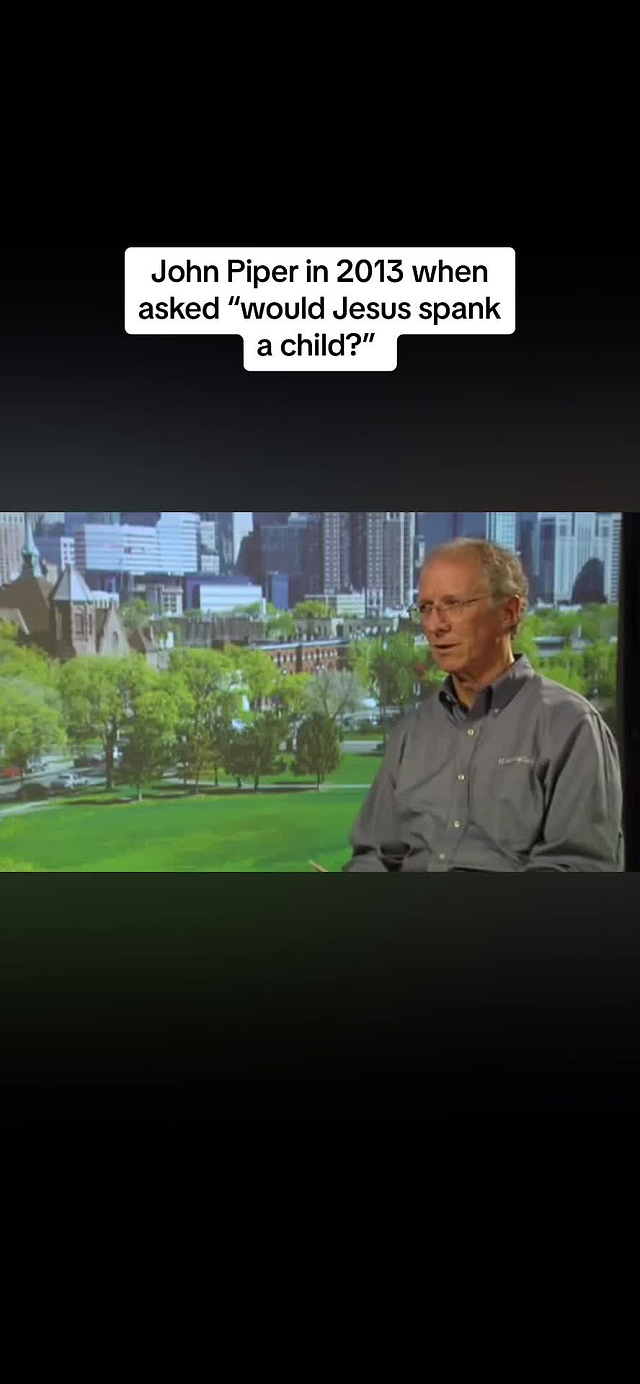
 Tiktok failed to load.
Tiktok failed to load.Enable 3rd party cookies or use another browser
In almost all of these pro-spanking materials, the authors acknowledge the reality that corporal punishment was being reconsidered — and sometimes equated with abuse — by parenting experts and the scientific community in the United States. But by claiming their methods were Biblical and “common sense”, these men not only rejected the claims that spanking was abuse -- but they stoked fears in parents that their “rights” to spank their child would soon be taken away. Dobson often referred to Sweden, where corporal punishment is outlawed, as well as to the influence of media that discouraged spanking, and claimed that both child-rights activists would “not rest until they have obtained the legal right to tell parents how to raise their children.14 John Piper said that “culture” equates spanking with hurting a child and that he would “gladly go to jail” over the issue.15 It was not a peripheral issue to him, nor to many of the authoritarian Christian men who were writing the best-selling books of the past few decades. Spanking was a ritual designed to create sinners who are in constant need of punishment in order to feel better.
Religious authoritarians dealt with their methods coming under scrutiny through appealing to the highest authority in the community: the Bible, setting it in direct contrast to child development experts. “Scripture itself prescribes corporal discipline and cautions parents not to abandon the use of the rod. The opinions of self-proclaimed experts who disagree frankly amount to little. In the end, the facts will be found to agree with the Word of God.”16 Any new findings about the appropriateness of corporal punishment could simply be brushed away, paling in comparison to the truth found within the Bible.
Corporal punishment is not new. However, by making it a religious ritual, bookended with spiritual reflection, prayer, and expressions of affection, RAP authors and pastors were able to re-establish a practice that was coming under well-earned scrutiny in the public sphere. My experience of spanking being combined with a religious heart-to-heart was a shift from the generation before. But placing a spiritual context around corporal punishment doesn’t make it any less harmful. In fact, combining physical punishment and spirituality is a form of spiritual abuse that often impacts a child’s spiritual life. It simply means that a large portion of society who considered themselves God’s faithful were parenting in a way discouraged by solid research and child development experts.
And it also means that multiple generations of Christians grew up with harmful parenting methods that impacted us as children, and likely still impact our nervous systems today. It did hurt us as children, despite what our parents told us. And now is the time to start being honest about what the long-term impacts are of equating pain with love.
Next week, we’ll dig into the research about corporal punishment, with a focus on how it impacts the nervous system, including how it impacts children and the adults they grow up to be.
Join us as we continue to unpack these impacts of authoritarian parenting, and in particular this month, the long-term impacts of corporal punishment on the well-being of children (and the adults they become) here at STRONGWILLED.
If you were raised in a home that utilized Religious Authoritarian Parenting methods, how was spanking talked about? How was discipline talked about? How did your community talk about outsiders or those who didn’t spank?
Dupper, D. R., & Montgomery Dingus, A. E. (2008). Corporal punishment in US Public schools: a continuing challenge for school social workers. Children & Schools, 30(4), 243-250.
Ibid, 243-250
Tripp started his own publishing company so it is hard to track the numbers on how many copies he has sold of the book Shepherding a Child’s Heart which was originally published in 1995. According to the Amazon numbers, the book is still selling around 900 copies a month, causing us to believe that millions of copies of this book have been sold.
Tedd Tripp. (1995). Shepherding a Child’s Heart. Shepherd Press. p. 109.
Pearl, M., & Pearl, D. (2015). To train up a child : child training for the 21st century. No Greater Joy Ministries, Inc. p. 61.
Evangelicals often claim that Jesus had to die an excruciating death simply because disobedience to God demands painful atonement.
James Dobson. (1978). The Strong-willed Child. Tyndale House Publishers. p. 172.
https://www.desiringgod.org/interviews/would-jesus-spank-a-child
https://www.desiringgod.org/interviews/would-jesus-spank-a-child
Ridgely, S. B. (2016). When Pain Becomes Symbolic of Commitment. Journal of religion and violence, 4(3), 373-386.
Ibid, p. 373-386.
Ibid, p. 373-386.
We believe that this religious factor doesn’t revoke the agency and responsibility of parents to be attuned to their children’s needs, despite what their religious community suggests.
https://dobsonlibrary.com/resource/article/9e6c1b33-b341-4617-aa11-70c9744fdf11
https://www.desiringgod.org/interviews/would-jesus-spank-a-child
John MacArthur (1998). Successful Christian Parenting. Word Publishing. p. 155.


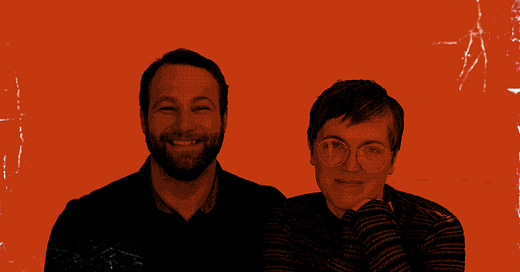




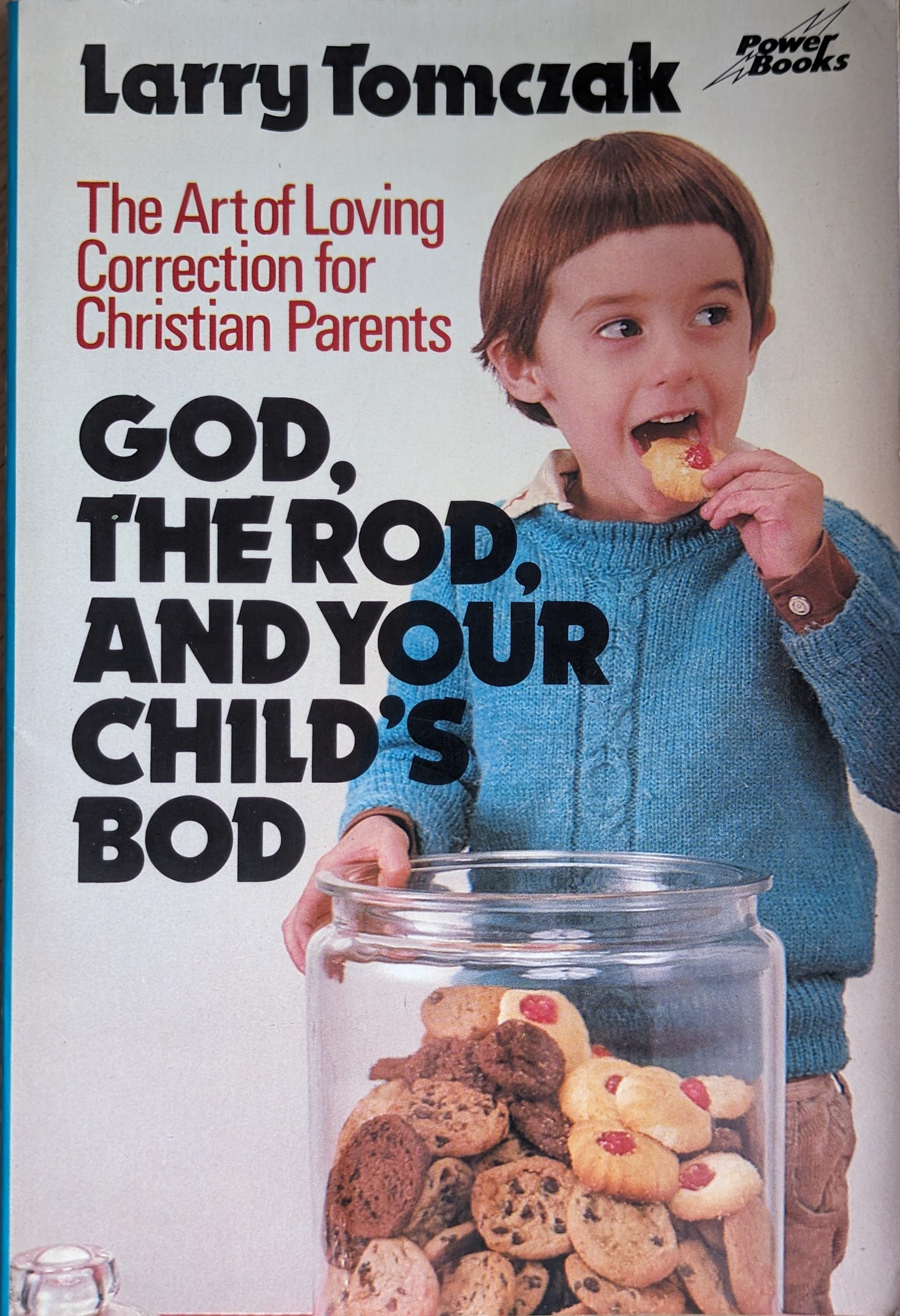
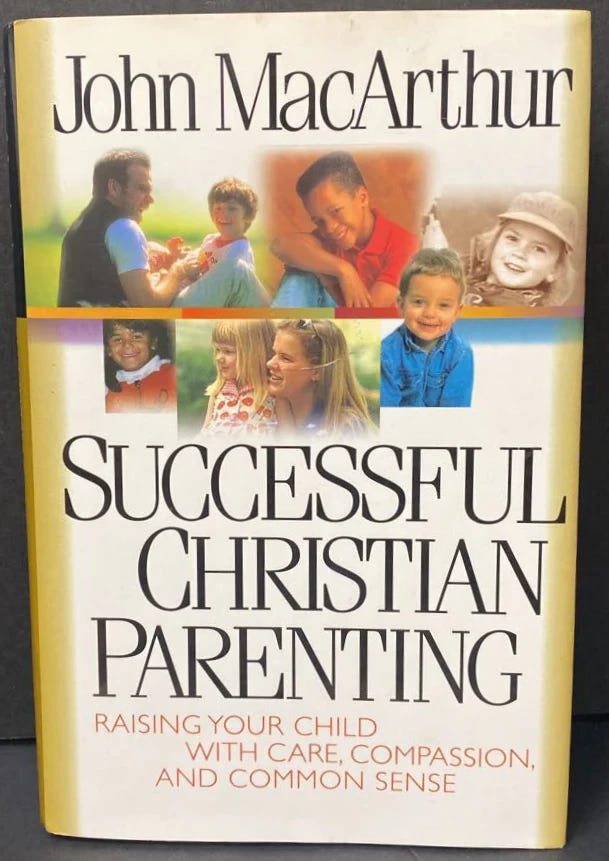
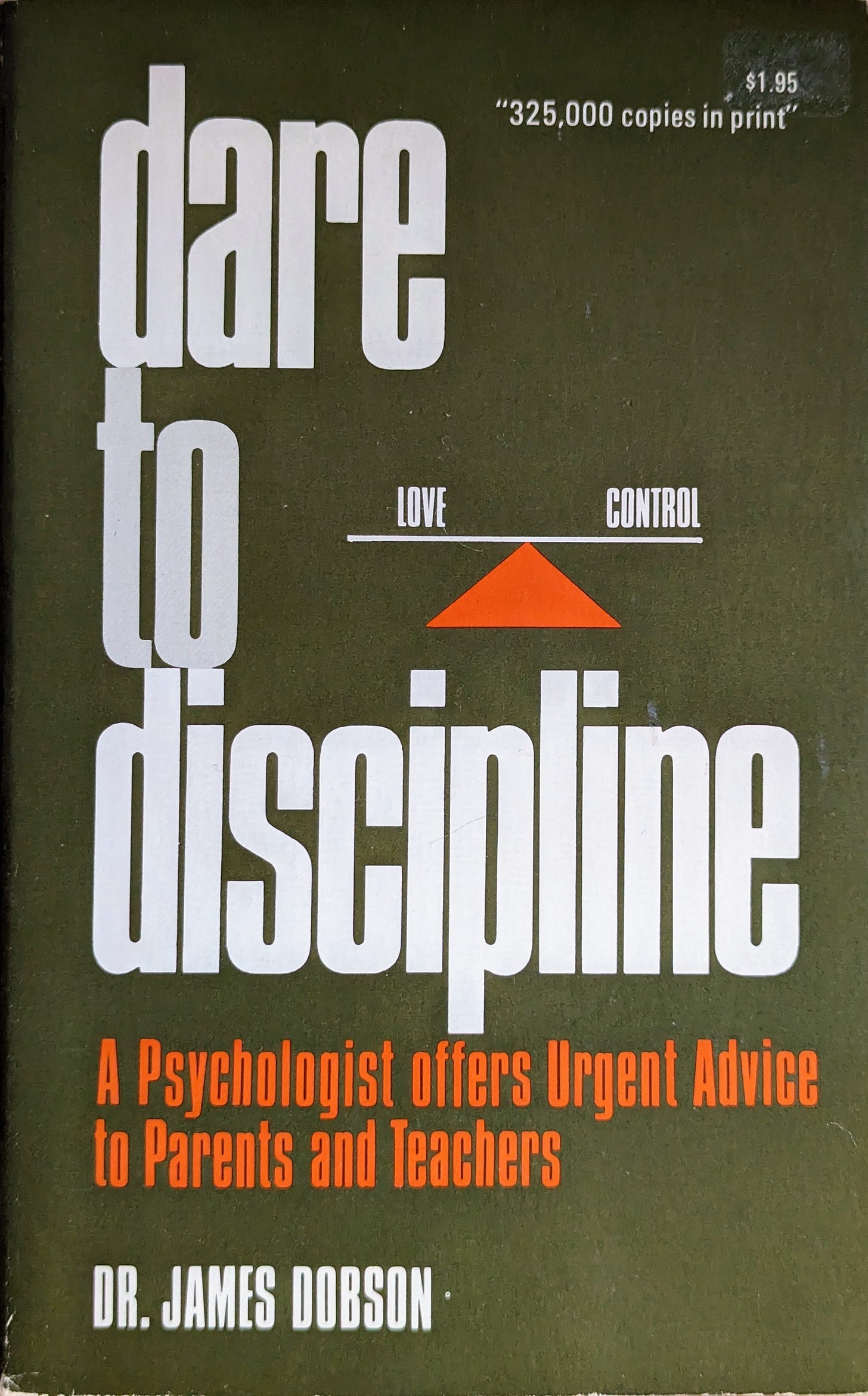
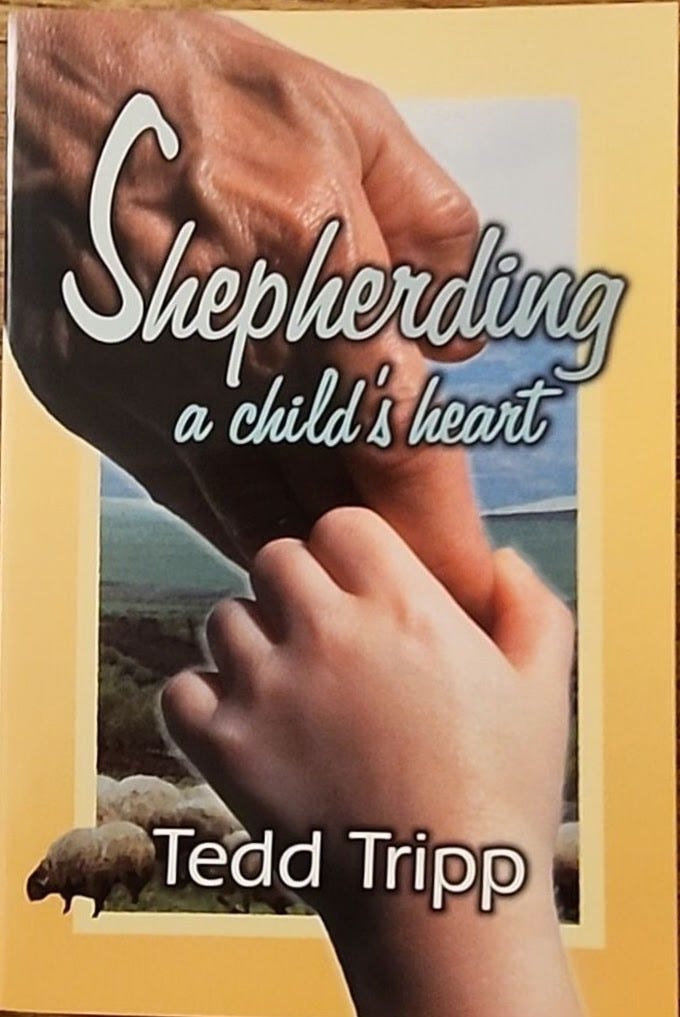
Thanks for sharing this. The title was even hard to read, but it helps to hear that others had simlilar experiences to mine. I remember learning that families who didn't spank their kids had wild heathens who ruled the house. Any time we saw one of "those" families, there was a comment about how they just needed some discipline.
We were spanked with wooden spoons or rulers because they were cheap, accessible in most rooms of the house, and easy to replace when they broke (which they did often, with 3 strong-willed kids in the house). I remember my parents proudly saying that they didn't discipline in anger but they sure seemed mad when they screamed at me and pulled me away from whatever I was doing that was deemed wrong. I wouldn't get the "calm" conversation until afterwards, though. I'd run to my room, crying of course, and they'd follow a few minutes later to make sure I understood the lesson. That's where they would soothe themselves with "this hurts me more than it hurts you." I had to pull myself together quickly so they wouldn't decide I was "overreacting" or I might get round 2. I realized recently that pattern gave me much more practice at intellectualizing my emotions instead of actually feeling them, so guess what I'm relearning in my 40s? I also hate to show my emotions in front of people and worry a lot about whether my reaction is appropriately sized for what's happening. I sometimes think I'm autistic, and then I think about these experiences, and it's hard to know now if I seemed "defiant" because I reacted to the world differently, or if abuse disguised as salvation taught me to respond to the world this way.
I don’t have many memories of being spanked. The only one I do have is of the time my mother decided to never spank me or my sisters ever again. I think she went to get the wooden spoon and then, in full tears, told me that she wasn’t gonna do it because it wasn’t right. She apologized for all the times she did spank me. I must have been five or six (my sisters are younger than me). I marvel at her courage to admit she was wrong and part ways with the cultural programming she was receiving both from church and her friendship with the only evangelicals we knew who, because they were English-speaking and could read them, had Dobson’s books on their bookshelves. I doubt she knew at the time that she was going to safeguard her relationship with her daughters by choosing attunement and connection over enforcing obedience and hierarchy. Or that she would give me a core memory that shaped me greatly into the kind of person that prioritizes safety and accountability in relationships.
About the same time I disaffiliated from my church, I broke-up with my best friend when we became parents and she began devouring Christian parenting advice (like Ted’s Tripp’s book). I had such a hard time watching her spank her daughter or assume normal toddler behavior was willful sin. I had heard enough from our church community (including the lead pastors who had five-six kids themselves) to know that spanking was encouraged within young families and was proudly perceived as a counter-cultural practice. While my church community wouldn’t have equated outright refusing to use corporal punishment with disobeying God, they would have called it “not choosing God’s best.” You know, just plain old guilting and emotional manipulation. But the manipulation works to keep people like my friend in the fold. Spanking is a cultural practice that differentiates who is in and who is outside of the group. And when you are in evangelical spaces, the stakes of being outside the group are magnified to existential proportions.